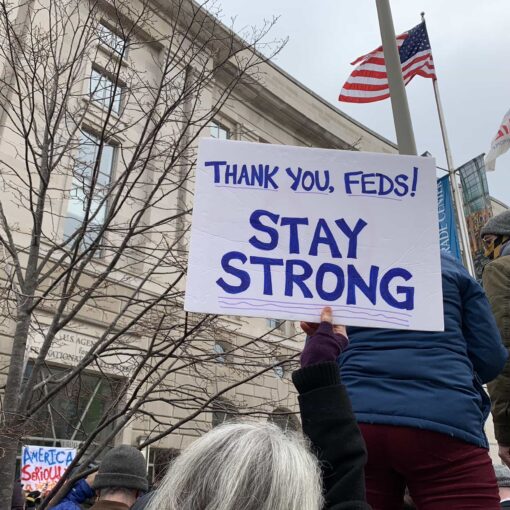 The Federal Energy Regulatory Commission (FERC), the agency responsible for approving interstate natural gas pipelines, compression stations and export terminals, saw more protests and arrests at its doorstep last week than ever before. Every morning, Beyond Extreme Energy (BXE) climate activists tenaciously blocked all its entrances, parking garage, and 1st street traffic access.
The Federal Energy Regulatory Commission (FERC), the agency responsible for approving interstate natural gas pipelines, compression stations and export terminals, saw more protests and arrests at its doorstep last week than ever before. Every morning, Beyond Extreme Energy (BXE) climate activists tenaciously blocked all its entrances, parking garage, and 1st street traffic access.
FERC is located on 888 1st Street, a typically busy city street. But last week it was the scene of early morning disruptions, chaos and emotional demonstrations as climate activists used every non-violent technique to shut down access to it.
Protestors blocked FERC’s doors, making employees wait several hours or caused them to report to work hours earlier. If they arrived after 7, they were forced to wait hours while DHS police removed BXE activists from barricaded doors and sidewalks.
Activists have paid a price for protesting at FERC too-there were 25 arrests on Monday, 16 arrests on both Tuesday and Wednesday, 12 on Thursday, and on Friday, 11. With each arrest was a charge of obstruction, meaning activists had to pay a $50 ticket or serve two weeks in jail. Most paid the fine and skipped jail but they’ll always have a police record.
While FERC employees’ and DHS police patience wore thin, it was the people protesting at FERC who were riled up.
Why are they angry at FERC and what would they say to Commissioners in FERC’s Board room?
Fifth Generation Farmer Confronts FERC
Maggie Henry grows organic food on her Pennsylvania farm in North Beaver Township. Her family has owned and worked on it five generations since 1900. She said FERC approved a 40 inch gas pipeline which was put in 30 feet from her front door. “I am angry at FERC and I am here all week because they rubber stamp these permits without taking anything into account,” she said.
Henry grew concerned after a mini-quake measuring 4.0 shook her home, cracking her drywall and compromising her basement wall. “It leaks like a sieve in the rain,” she said. She expressed fear the regular mini-quakes may compromise pipe integrity. “I have no idea what damage was done to the pipeline welds. These pipelines routinely explode.”
She is also concerned about affects to her water from hydraulic fracturing (fracking) chemicals she claims are being dumped in streams nearby. “I would tell FERC this is the face of the people you are poisoning for money,” she said.
Henry said of FERC, “They’re not doing their job-they’re supposed to be protecting the people, regulating energy but they’re just saying yes to all of this.”
She isn’t the on ly one angry at FERC over its near 100% approval of natural gas infrastructure. Luke Davis, of Iowa, a great climate marcher who walked 3000 miles cross-country said he’s angry at FERC over land grabs for projects across his state. “There’s a proposed pipeline across my state and FERC can grant them the use of eminent domain to take land,” he said.
ly one angry at FERC over its near 100% approval of natural gas infrastructure. Luke Davis, of Iowa, a great climate marcher who walked 3000 miles cross-country said he’s angry at FERC over land grabs for projects across his state. “There’s a proposed pipeline across my state and FERC can grant them the use of eminent domain to take land,” he said.
Davis decided to get involved in the BXE actions after his state legislators didn’t act. “Our governor is not gonna do anything about it so I’m gonna do something about it and now I’m a FERC blockader,” he said. Davis was arrested for blocking FERC with seven other protesters a few minutes later.
Gas Infrastructure Leads to More Fracking
FERC is approving natural gas pipelines in states like Pennsylvania in order to accommodate increased gas production due to fracking. Although FERC does not review permits for fracking wells, environmentalists claim that FERC’s approvals of natural gas infrastructure and export terminals will lead to more fracking.
Two residents living near a fracking well also participated in the BXE protests. Penni Laine and Marilyn Crowley share a home with their seven children in Butler County, Pennsylvania. Gas Company XTO drilled a well 500 feet from their home two years ago.
Laine said, “They started drilling by my house. My water is bad.” So she took her concerns to the Pennsylvania Department of Environmental Protection (DEP). “The DEP told me I could no longer drink my tap water,” she said. Her complaints to state representatives didn’t help either so she joined BXE protests at FERC.
“FERC nee ds to come drink my tap water,” she said.
ds to come drink my tap water,” she said.
Crowley, who has three children, said her daughter is afraid to drink or use water at their neighbor’s homes. “FERC needs to explain to my 9-year-old daughter why she is coughing every day,” she said.
Pennsylvanian Sees His Community Destroyed
Another Pennsylvania resident, Michael Badges-Canning, who lives in the Shalefields of Pennsylvania, said he helps people in his community deal with the fallout from natural gas pipelines, and compressor stations and fracking wells.
“I work with folks who have lost their water, businesses, and home values due to their proximity to gas production,” he said. He said he got involved in the BXE climate actions primarily for his children and grand-children. “I would tell FERC the more you grant permission to remove this stuff, the worse it is gonna be above ground,” he said.
Effects of Gas Infrastructure
Raschawne Glenn, a climate activist with BXE, said she got involved because of friends at Seneca Lake who are on the front lines of a massive natural gas storage project in its salt caverns. “These are real people-and [FERC] is not thinking of the people in these communities,” she said, referring to those affected.
One Climate Marcher, Benjamin Bushwick, from Montgomery County, MD, walked from LA to DC with the Climate March before joining BXE. He said that he was not angry at FERC but upset by the damage he witnessed in communities across the country. “I don’t have anger in my heart,” he said. “But the anger being expressed here is the anger of people in pain.”
Henry believes FERC’s approval process is driven by greed. “You can’t eat money,” she said. “Its not just an impact here, its an impact everywhere.”
 Protest Tactics Succeeded at Shutting Down FERC
Protest Tactics Succeeded at Shutting Down FERC
By Friday protesters had become expert at rapidly changing tactics. When DHS police moved in to arrest blockaders, more took their place. When DHS police deployed its heavy equipment to cut the bear-traps protesters had locked themselves in, other protesters shifted to speak directly to FERC employees.
By Friday FERC employees were beginning to hear the stories of the affected, especially those of the Pennsyvanians who spoke as they waited for DHS police to unblock FERC’s entrances. Protesters spoke on bull horns directly to FERC employees about the consequences resulting from FERC approvals—the harm done to them by fracking, gas pipelines, compression stations and gas storage facilities. FERC employees heard about the damage—to protester’s farms, homes, communities, air, land and water. Commuters who were blocked by DHS police tape also heard the stories. FERC, the agency which approves all natural gas infrastructure, finally heard from the people, and the people were angry.
Video by Rob Brune, DC Media Group
[fshow photosetid=72157649114774132]
Photos by Resa Sunschine, DC Media Group





